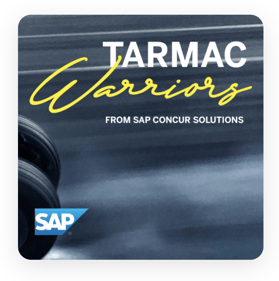How Policy Compliance Impacts Today's Travelers

What does it look like for today’s travelers returning to the road? That’s the question SAP Concur hopes to answer with its new 3-part podcast series, Tarmac Warriors. Each episode takes an in depth look at an unexpected traveler and follows them in their experiences navigating the new business landscape.
The latest episode tackles the issue of travel policy compliance, and SAP Concur turned to Direct Travel’s own Senior Vice President of Account Management, Michael Nelson, to help address how this topic impacts businesses. We've highlighted a few top takeaways from the podcast, which you can also listen to below.
'Your 0ne-Stop Shop'

Your business's travel policy is one of two core components of a successful, managed travel program, the other of course being your Travel Management Company (TMC). We've talked before about the wide-ranging value a TMC brings to the table, from risk management and traveler experience to technology solutions and supplier relationships. Recently though, the strength of your travel policy and TMC have been even more important due to changes in travel caused by COVID-19 restrictions.
During the podcast, host Heather Greenwood-Davis points this out while interviewing the owner of a fruit company and discussing the sheer number of rules that must be tracked in order to ensure a successful business outcome. For travelers, this can seem overwhelming, but the process can be simplified by having a clear policy in place and a TMC partner on hand to help manage relevant rules and restrictions.
As Michael puts it when asked about the role a TMC plays in this process, "From a traveler perspective, a managed travel program gives the individuals an approved path for their bookings—think of it as a one-stop shop."
Defining Compliance
At first look, compliance can be defined as the action of following and adhering to company policies. However, the integral and intertwined aspects of an organization's travel policy go beyond a "do this, not that" mentality.
Michael notes that there are two different ways to look at compliance and the effect it has on your business. The first is compliance within the travel program itself. This may include whether your travelers are using your organization's online booking tool (OBT), how far in advance travelers are booking, and if they are supporting your supplier relationships by using preferred vendors.
The second component to address is travelers booking outside the managed program through other vendors and third-party OBTs, aka travel management leakage. As Michael shares, leakage is a serious issue because elements like preferred suppliers and booking through your TMC work together to create a clear path of approval going forward. When an employee takes booking and travel decision-making into their own hands, it can result in an employee playing the role of "travel agent." This costs the company both time and money, as the employee is no longer focused on doing the job they were hired to do.
Instilling Traveler Confidence
A lack of compliance doesn't only pose a risk to your organization's business goals and supplier relationships. Travelers also need to understand how non-compliant behavior can negatively impact their travel experience.
"Look at compliance as a way to ease your trip," says Michael. "Travelers should have comfort and confidence knowing they're booking through their organization's preferred channels and, as a result, have an underlying support structure to help keep them safe on their journey."
This is the "fruit of compliance" as Greenwood-Davis cleverly dubs it during the interview. Travelers should take peace of mind when they book within policy and recognize that the suppliers have been properly vetted and are adhering to the latest COVID-19 protocols.
While your organization's travel policy may look different depending on whether you're a fruit importing company like the business featured in the podcast, an emerging tech startup, or a time-tested national organization, compliance consistently delivers benefits across the board. To learn more, listen to the podcast in its entirety or in part (Michael's interview begins at the 8:15 mark) using the link below.


